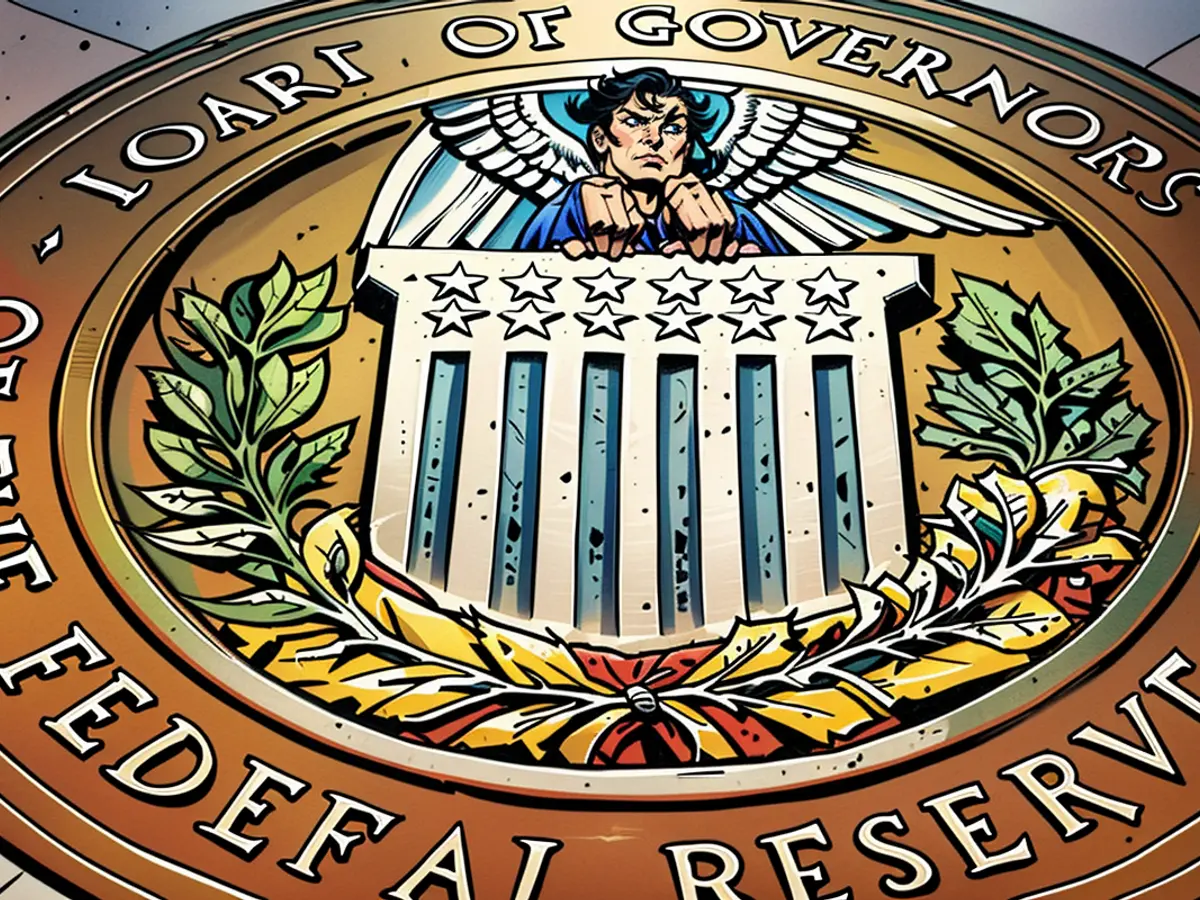The nation's central bank - Combatting inflation: Federal Reserve maintains elevated interest rate
The Federal Reserve (Fed) has decided to maintain its high-interest policy, with no plans to reduce rates this year. The central bank's benchmark rate stayed the same for the seventh consecutive time at a range of 5.25% to 5.5%, as announced by the Fed in Washington. During this time, businesses can borrow money from the central bank at this interest rate.
The benchmark rate is now at its highest point in more than two decades. Additionally, new data from the Fed suggests that inflation might be more persistent than initially anticipated.
On the other hand, the European Central Bank (ECB) trimmed its rate last week and reduced the benchmark rate by 0.25 percentage points. However, the Fed might take a more cautious approach before following suit. Fed Chair Jerome Powell stated that the confidence needed to begin easing monetary policy could take longer to develop. "We're not sure what's to come, but in the meantime, we have been making progress on inflation with our current strategy," Powell stated.
The Fed's updated economic outlook predicts that it may need to cut rates once more this year, but only once. In their previous two forecasts, the US central bank expected three rate cuts of 0.25 percentage points for 2023. The decision-makers at the Fed now anticipate an average interest rate of 5.1% for this year (March: 4.6%), indicating a 0.25 percentage point cut.
Since March 2022, the bank has raised its benchmark rate rapidly in an attempt to combat inflation at an unprecedented rate of more than five percentage points. However, the Fed has yet to implement any additional hikes. The inflation rate - which stood at a staggering 9% in the summer of 2022, the highest in about four decades - has shown notable improvement since the interest rate hikes. Nevertheless, the Fed's 2% target seems unattainable.
US inflation slightly decreases
A positive update was released hours before the interest rate decision by the US Labor Department. According to their report, inflation in the US has slightly moderated. Consumer prices rose by 3.3% in May compared to the previous year. In April, the rate was 3.4%. The analysts had estimated the same inflation rate for May. The Federal Reserve also released its economic projections, which included forecasts for inflation.
However, these estimations were slightly more pessimistic. The Fed anticipates an average inflation rate of 2.6% in the US this year (March: 2.4%). For 2025, the Fed predicts an inflation rate of 2.3% (March: 2.2%). The core inflation rate, which omits food and energy prices, is expected to be 2.8% for 2023 (March: 2.6%). This figure is more significant to central bankers, as it offers a more accurate depiction of the overall price trend by removing temporary variables.
Fed Chair Powell deemed the inflation forecasts "conservative." He considered them "good" numbers yet not "great." If the US Labor Department releases more favorable inflation data in the months ahead, the predictions could be enhanced, Powell added.
The Federal Reserve did not alter its economic outlook for the US. The US economy is projected to expand by 2.1% in 2024, as predicted in March. This imparted lower pressure on the Fed to lower interest rates promptly. The US Federal Reserve can afford to exercise patience and watch the situation given the robust economic growth.
Read also:
The economic situation in Europe differs from that of the USA, with the European Central Bank (ECB) reducing its interest rate last week. Despite the US Federal Reserve (Fed) maintaining its high-interest policy, central banks worldwide, including the ECB, are closely monitoring inflation rates. Jerome Powell, chair of the Fed, expressed cautiousness about easing monetary policy, considering the uncertainty of the future.
While the Fed's benchmark rate is at a historic high, data suggests that inflation might persist longer than initially anticipated. Conversely, the Fed's 2% target remains difficult to reach. The US Federal Reserve System operates independently from the Ministry of Labor in Washington, focusing on managing the nation's monetary policy.
Businesses in the USA can borrow money from the Fed at the established interest rate, which affects various sectors and prices. Central bankers pay close attention to the core inflation rate, which excludes food and energy prices, for a clearer understanding of inflation trends.
The US Labor Department reported a slight decrease in inflation rates, with consumer prices rising by 3.3% in May compared to the previous year, indicating a positive outlook for the nation's economic recovery. Powell deemed the updated inflation forecasts "conservative" and considered them good numbers, though not great, hinting that future developments might further enhance the projections.
As the US economy grows robustly, the Fed can afford to exercise patience and observe the situation without feeling pressured to lower interest rates immediately. In the European context, the ECB may adjust its approach to combat inflation, given the data trends.
The Federal Reserve System, established in 1913, has a long-standing history of focusing on the nation's monetary policy, working closely with the White House and Congress. Jerome Powell serves as the current chair of the Fed, guiding its operations during challenging economic circumstances.
Central banks worldwide play a crucial role in addressing inflation, interest rates, and the broader economic situation, with the goal of ensuring long-term stability and promoting economic growth. The debate on monetary policy and the appropriate response to inflationary pressures continues to be a significant topic among economists, policymakers, and financial analysts.
The ongoing discussions around the nation's central bank's role in combatting inflation demonstrate the complex nature of macroeconomic management and the importance of staying informed on the latest data and trends in the economy.








